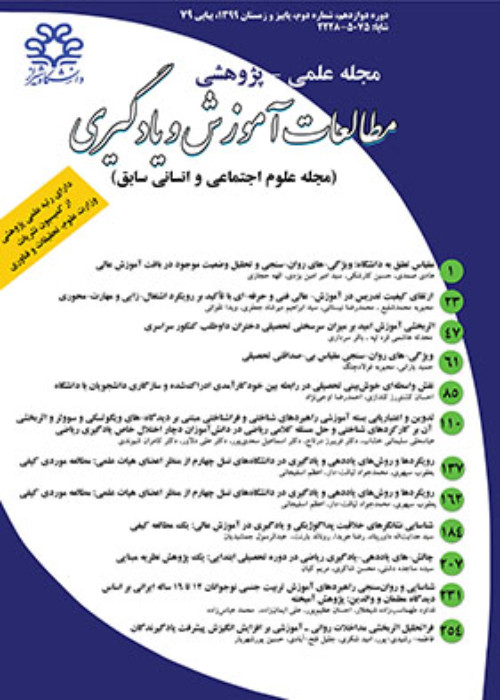The Effect of Metacognitive and Emotional Prompts on the Monitoring Accuracy, Regulation Accuracy and Types of Cognitive Load in Students
The present study aimed to investigate the effect of metacognitive and emotional prompts on monitoring accuracy, regulation accuracy and the types of cognitive load in students. The research method was experimental with pretest-posttest and control group design. For this purpose, 64 female students of the seventh grade were randomly assigned to three experimental groups and one control group. In the pre-test, after studying the exam text, they were asked to predict their score on the exam, identify the paragraphs that needed to be restudied, and answer the Cognitive Load Questionnaire. Finally, an exam was taken from the content of the studied text to determine the accuracy of the participants' predictions. In the post-test, the procedure was the same, except that the experimental groups received diagnostic monitoring cues including metacognitive and emotional prompts after studying the text; the first experimental group received metacognitive monitoring cues in the form of stimulating questions (Metacognitive prompts), the second experimental group was stimulated to think about their epistemic emotions (Emotional prompts) and the third experimental group received both types of prompts while the control group did not receive any prompts. The results showed that the scores of monitoring accuracy, regulation accuracy and the germane load of the experimental groups were significantly higher than those of the control group in the post-test. However, no significant difference was observed across the groups with respect to their intrinsic loads. Notwithstanding, the score of extraneous load in the group that received metacognitive prompts was significantly different from that of the control group and of the group that received emotional prompts. The finding suggests that in the process of education, prompts by providing appropriate cues to students, allow them to use their working memory capacity for learning new constructs and to make realistic judgements of their learning.
پرداخت حق اشتراک به معنای پذیرش "شرایط خدمات" پایگاه مگیران از سوی شماست.
اگر عضو مگیران هستید:
اگر مقاله ای از شما در مگیران نمایه شده، برای استفاده از اعتبار اهدایی سامانه نویسندگان با ایمیل منتشرشده ثبت نام کنید. ثبت نام
- حق عضویت دریافتی صرف حمایت از نشریات عضو و نگهداری، تکمیل و توسعه مگیران میشود.
- پرداخت حق اشتراک و دانلود مقالات اجازه بازنشر آن در سایر رسانههای چاپی و دیجیتال را به کاربر نمیدهد.



